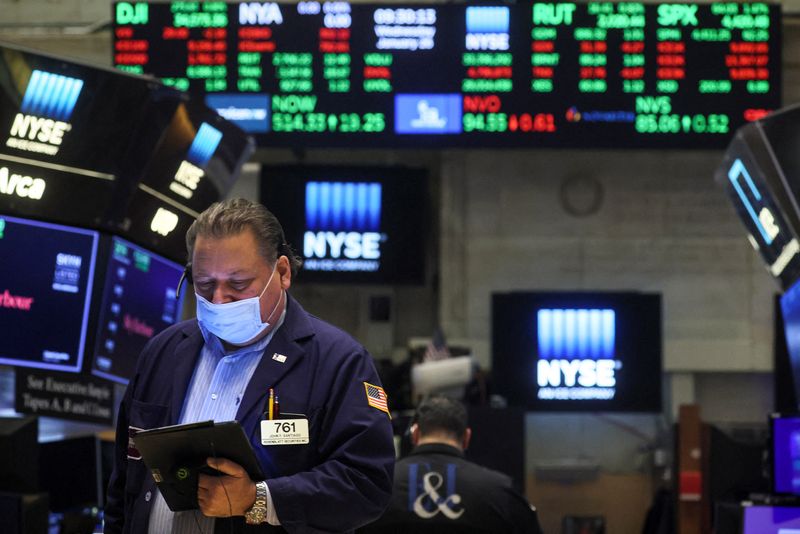Investing.com - Asian Pacific shares declined on Thursday as US indices faced significant losses following a sell-off in tech stocks.
By 10:40 am AEST (12:40 am GMT) the S&P/ASX 200, KOSPI 200, and Nikkei 225 each fell within a range of 0.8%-2.6%.
In the US, Wednesday’s sell-off intensified, erasing hundreds of billions of dollars in value from the Magnificent Seven group of tech giants and pushing the NASDAQ Composite to its first decline of 3% or more in 400 trading days. Investor enthusiasm for artificial intelligence, which had driven stock surges earlier in the year, has waned. Tesla Inc (NASDAQ:TSLA) fell 12% after delays in its robotaxi rollout, sending ripples across the tech sector.
The S&P 500 dropped 2.3%, experiencing its worst day since December 2022. The Dow Jones Industrial Average declined by 1.2%, losing 504 points. The tech-heavy Nasdaq saw a 3.6% drop, its largest since October 2022. After a period of record highs driven by AI optimism and a promising inflation report, investors have started reallocating funds to other sectors, potentially heralding a significant market rotation.
Disappointing earnings from Tesla and Alphabet (NASDAQ:GOOGL) spurred Wednesday's major declines, with the Magnificent Seven collectively losing $768 billion in market value, the largest wipeout of this scale since Meta Platforms Inc (NASDAQ:META) went public as Facebook in 2012.
The market's reaction to Alphabet's earnings, which slightly surpassed estimates but raised concerns about AI spending, showed the high expectations for these tech giants. Anticipations are high for upcoming earnings reports from NVIDIA Corporation (NASDAQ:NVDA), Microsoft Corporation (NASDAQ:MSFT), and other key players. Semiconductor and AI supply chain-linked stocks also took a hit, with Super Micro Computer Inc (NASDAQ:SMCI) dropping 9.1%, Broadcom Inc (NASDAQ:AVGO) falling 7.6%, and both Qualcomm Incorporated (NASDAQ:QCOM) and Advanced Micro Devices Inc (NASDAQ:AMD) declining by over 6%.
This shift impacted the broader indexes, with defensive sectors like utilities, consumer-staples, health-care, and energy in the S&P 500 outperforming. Lockheed Martin Corporation (NYSE:LMT) rose 2.8%, hitting an all-time high, while AT&T (NYSE:T) recorded its biggest gain of the year. Visa (NYSE:V), however, fell 4% after reporting lower-than-expected quarterly revenue growth.
Smaller firms, which are more affected by higher interest rates due to floating-rate debt, might benefit from potential rate cuts. Yields on United States 10-Year Treasury notes held steady at 4.285%.
In commodities, oil prices increased by 0.8%, closing at $77.59 a barrel. Copper futures declined for an eighth consecutive day, losing earlier gains driven by AI data center projections. Brent crude oil rose 0.9% to $81.71 a barrel, while gold edged down 0.2% to $2,393.39.
Chinese shares ended lower due to muted investor sentiment. The Shanghai Composite Index fell 0.5% to 2,901.95, the Shenzhen Composite Index declined 1.3%, and the ChiNext Price Index dropped 1.2%. Property and auto stocks led the losses, with limited expectations for property stimulus measures from the upcoming Politburo meeting. Poly Developments & Holdings Group fell 3.1%, China Vanke dropped 2.9%, BYD shed 1.3%, and Great Wall Motor declined 5.9%. Telecom stocks gained, with China Mobile up 0.9% and China Telecom rising 1.3%.
Hong Kong shares also ended lower, with technology stocks weighing down the market. The Hang Seng Index fell 0.9% to 17,311.05, and the Hang Seng Tech Index declined 1.5%. Key US economic data awaited later this week, including PMI and 2Q GDP. Major decliners included Meituan, which fell 4.1%, and Xiaomi, down 2.5%. Chow Tai Fook Jewellery dropped 6.6% after weak 1Q sales, and ASMPT fell 23% following a disappointing 2Q and guidance. Gainers included China Resources Power (+4.2%) and Cnooc (+1.2%).
Japanese stocks ended lower amid cautious sentiment over potential Bank of Japan rate increases and a rebounding yen. Mitsubishi Motors dropped 7.4% following a drop in 1Q net profit, Isuzu Motors lost 5.4%, and Sumitomo Realty & Development fell 3.9%. The Nikkei Stock Average declined 1.1% to 39,154.85, with investors focusing on economic data and corporate earnings. The 10-year Japanese government bond yield rose one basis point to 1.070%.
Indian shares also closed lower, impacted by finance and bank stocks amid lingering concerns over the budget plan and proposed higher capital gains taxes. Bajaj Finserv fell 2.4%, Axis Bank shed 1.8%, and State Bank of India lost 1.35%. Tech Mahindra led gains with a 2.7% rise, while Tata Motors added 2.6%. The benchmark Sensex declined 0.35% to 80,148.88.
In Europe, U.K. stocks slipped, with the FTSE 100 Index dropping 0.2% to 8,153.69. Ocado (LON:OCDO) Group PLC posted the largest decline (-4.6%), followed by Breedon Group PLC (-3.8%) and CMC Markets PLC (-3.7%). Ascential PLC was the biggest gainer (+26%), followed by Zegona Communications PLC (+17%) and Oxford Nanopore Technologies PLC (+10%).
Elsewhere in Europe, markets closed lower. The STOXX Europe 600 Index declined 0.6% to 512.30, Germany's DAX fell 0.9% to 18,387.46, and France's CAC 40 lost 1.1% to 7,513.73.
